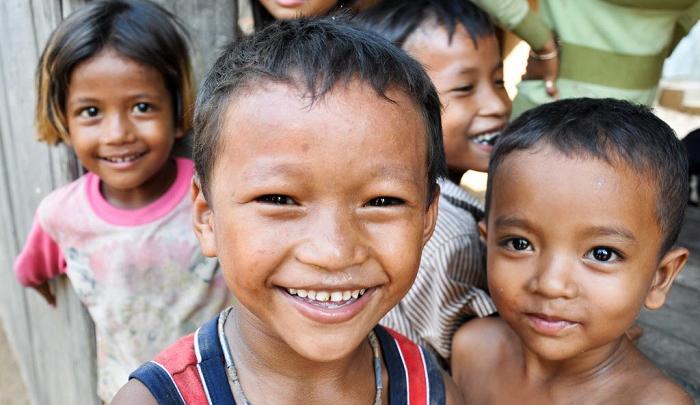
BRUSSELS, Belgium (June 6, 2014) – This year’s G7 meeting in Brussels will be remembered as a summit asking more questions than it answered about the value of this annual forum, says World Vision.
“After a challenging year, the G7 really needed to prove its worth at this year’s meeting. But their lack of action on areas that affect the world’s poorest children, leaves clouds of doubt hanging over the value of the G7 as a group,” says World Vision spokesperson Chris Derksen-Hiebert.
“Talk is cheap, and it’s particularly disappointing given the G8’s recent history of moving from good intentions to real commitments that have saved the lives of children.”
“We came into this year’s meeting calling for tangible commitments for the children of Syria, South Sudan and Central African Republic, and for the more than two million children who still die from hunger and undernutrition every year.
“We leave it having seen some strong signs of leadership by individual G7 countries – such as Canada on maternal and child health, and the UK on preventing sexual violence in conflict – but little progress by the forum itself. We have serious questions about whether this group still has ambitions to be a progressive force for the rights of children globally.”
Based on previous G8 priorities and commitments, this year World Vision challenged leaders to deliver in four areas this year, for children, says Derksen-Hiebert.
“On conflict and fragility, we said they needed to unite to commit to the development needs of children in fragile and conflict-affected contexts, prioritizing the world’s most vulnerable children in places such as the DRC, South Sudan, the Central African Republic and Syria. But the G7’s discussions about conflict don’t mention the humanitarian and development needs of children. For underfunded and neglected humanitarian appeals, this is disappointing, and potentially deadly.
“On hunger and nutrition, we said they needed to lock in solid, measurable commitments to support millions of undernourished mothers and children; ensure that food security programs include, and are measured against, targets for improved nutrition for women and children; pledge to support governments around the world to develop national targets to improve nutrition for children in their first 1,000 days; and build support for the establishment of a target for the elimination of malnutrition, particularly stunting and wasting in the post-2015 framework. Thanks to Canada’s strong leadership on this issue, the G7 has reaffirmed its commitments.
“On accountability, we said they needed to deliver on the promises they have made, and publish an open accountability report ahead of this and every summit. They’ve promised to do one next year, but after failing to publish one this year, their credibility is questionable.
“On Syria, we said leaders needed to reaffirm their commitment to the children of Syria, by following through on promises they made at last year’s summit, especially providing impartial humanitarian aid support, and maximizing diplomatic pressure to negotiate a peaceful resolution to the crisis. They have committed to provide humanitarian assistance, but we urge them to ensure this is done on the basis of need alone.”
“You can understand why people may question the value of this group of leaders. In recent years, it has been demonstrated how it can be a powerful force for good – look at 2005 in Gleneagles, and 2010 in Canada – but now it appears to be little more than a talkfest.”
Ends
- NOTES TO EDITORS
World Vision’s G8 scorecard
- In Brussels, G7 leaders reaffirmed their commitment to maternal and child health, but failed to commit to action on a number of important areas for the world’s poorest children, leaving unanswered questions about their value as a group of leaders. World Vision’s grade: D
- In Lough Erne in 2013, the G8 leaders failed to throw their weight behind promises made by governments, corporations and aid agencies at the Nutrition for Growth Summit held ten days earlier, which had the potential to save millions of children. The Lough Erne Declaration had potential, but was full of ‘shoulds’ where there needed to be ‘musts’. World Vision’s grade: B–
- At Camp David in 2012, the G8 set up the New Alliance for Food Security and Nutrition. However, it ignored nutrition until 2013, when a change in focus was made, for the better. World Vision’s grade: C+
- The G8 failed vulnerable children at Deauville in 2011 by neglecting to pledge or commit to improving child mortality and health. World Vision’s grade: F
- In Muskoka in 2010, the G8 made an exciting US$5 billion pledge to the UN’s women and children’s health movement, which they are on track to deliver. World Vision’s grade: B
- In L’Aquila in 2009, the G8 promised US$22 billion over three years to food security, with real potential to save millions of lives. Five years later, this commitment has not been fulfilled. World Vision’s grade: C
About World Vision:
World Vision is a Christian humanitarian organization conducting relief, development, and advocacy activities in its work with children, families, and their communities in nearly 100 countries to help them reach their full potential by tackling the causes of poverty and injustice. World Vision serves all people regardless of religion, race, ethnicity, or gender. For more information, please visit www.WorldVision.org/media-center/ or on Twitter @WorldVisionUSA.
Highlights
- Amid questions about its effectiveness as a group of leaders, the G7 needed to prove its worth – and it has failed to do so, says aid agency
- Canada’s leadership on maternal, newborn and child health among the only bright lights, says World Vision